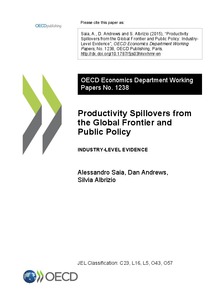Productivity spillovers from the global frontier and public policy. Industry-level evidence
"For much of the second half of the twentieth century, labour productivity grew rapidly in most OECD economies, fuelled by the adoption of a large stock of unexploited existing technologies. However, the slowdown in productivity growth over the past decade underscores the idea that as economies...
| Main Authors: | , , |
|---|---|
| Institution: | ETUI-European Trade Union Institute |
| Format: | TEXT |
| Language: | English |
| Published: |
Paris
2015
OECD |
| Subjects: | |
| Online Access: | https://www.labourline.org/KENTIKA-19111540124919397229-Productivity-spillovers-from-t.htm |
| _version_ | 1771659894701686784 |
|---|---|
| author | Saia, Alessandro Andrews, Dan Albrizio, Silvia |
| author_facet | Saia, Alessandro Andrews, Dan Albrizio, Silvia |
| collection | Library items |
| description | "For much of the second half of the twentieth century, labour productivity grew rapidly in most OECD economies, fuelled by the adoption of a large stock of unexploited existing technologies. However, the slowdown in productivity growth over the past decade underscores the idea that as economies converge toward the global technological frontier, the ability to capitalise on new innovations developed at frontier becomes more important. Using industry level data for 15 countries over the period 1984-2007, this paper augments the neo-Schumpeterian framework to identify the relevant channels and policies that shape an economy’s ability to learn from the global productivity frontier. An economy’s ability to benefit from frontier innovation is a positive function of its degree of international connectedness, ability to allocate skills efficiently and investments in knowledge based capital, including managerial capital and R&D. Productivity growth, via more effective learning from the global frontier, is supported by a policy framework that promotes efficient resource allocation – including lower barriers to entrepreneurship, efficient judicial systems and bankruptcy laws that do not overly penalise failure – and fosters the creation of markets for seed and early stage finance. Innovation policies that support basic research and facilitate the absorption of external knowledge for firms – including via university-industry R&D collaboration – also enhance spillovers from the global productivity frontier, and consequently, productivity growth." |
| format | TEXT |
| geographic | OECD countries |
| id | 19111540124919397229_6d4b066a694a4d149cfb61bab60421d2 |
| institution | ETUI-European Trade Union Institute |
| is_hierarchy_id | 19111540124919397229_6d4b066a694a4d149cfb61bab60421d2 |
| is_hierarchy_title | Productivity spillovers from the global frontier and public policy. Industry-level evidence |
| language | English |
| physical | 44 p. Digital |
| publishDate | 2015 |
| publisher | Paris OECD |
| spellingShingle | Saia, Alessandro Andrews, Dan Albrizio, Silvia industrial economics innovation labour productivity productivity technological change Productivity spillovers from the global frontier and public policy. Industry-level evidence |
| thumbnail | https://www.labourline.org/Image_prev.jpg?Archive=108989192616 |
| title | Productivity spillovers from the global frontier and public policy. Industry-level evidence |
| topic | industrial economics innovation labour productivity productivity technological change |
| url | https://www.labourline.org/KENTIKA-19111540124919397229-Productivity-spillovers-from-t.htm |

